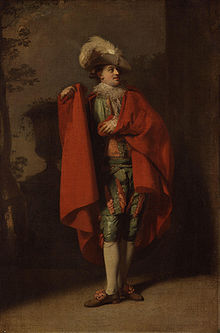John Palmer (actor)
| John Palmer | |
|---|---|

John Palmer as Count Almaviva in The Spanish Barber, portrait by Henry Walton, 1779
|
|
| Born | c. 1742 London |
| Died | 1798 (aged 55–56) Drury lane, London, England |
| Occupation | actor |
| Years active | c.1762-1798 |
John Palmer (c. 1742–1798) was an actor on the English stage in the eighteenth century. There was also another John Palmer (1728–1768) who was known as Gentleman Palmer.
He was born in the parish of St Luke's, Old Street, London, about 1742, was son of a private soldier. In 1759 the father served under the Marquis of Granby, and subsequently, on the marquis's recommendation, became a bill-sticker and doorkeeper at Drury Lane Theatre. When about eighteen the son John recited before David Garrick as George Barnwell and Mercutio; but Garrick found no promise in him, and joined his father in urging him to enter the army. Garrick even got a small military appointment for him; but Palmer refused to follow his counsel, and entered the shop of a print-seller on Ludgate Hill.
On 20 May 1762, for the benefit of his father and three others, he made his first appearance on any stage, playing Buck in the Englishman in Paris. This performance he repeated for benefits on the 21st, 24th, and 25th. Palmer was then engaged by Samuel Foote, who said that his "tragedy was damned bad", but "his comedy might do" for the "little theatre in the Haymarket", now known as the Haymarket Theatre, where, in the summer of 1762, he was the original Harry Scamper, an Oxford student, in Foote's Oracle. Being refused an engagement by Garrick, whom he still failed to please, he joined a country company under Herbert, and played, at Sheffield, Richmond in Richard III. Returning to London, he played, for the benefit of his father and others, George Barnwell in the London Merchant. He then re-engaged with Foote, but was dismissed in the middle of the season. After acting at Portsmouth he was engaged by Garrick, at a salary of 20 shillings. a week, for Drury Lane, but did not get higher than the Officer in 'Richard III' (act ii. sc. i.) For his father's benefit Palmer appeared as Dick in the Apprentice. At the Haymarket, in the summer of 1764, he was the original Sir Roger Dowlas in Foote's Patron. Being refused at Drury Lane an increase of salary, he went to Colchester, under Hurst, and was so lightly esteemed that, but for the intercession of Mrs. Webb, an actress of influence, he would have been discharged. In Norwich he married a Miss Berroughs, who had taken a box for his benefit. He then gave, at Hampstead and Highgate, and in various country towns, George Alexander Stevens's Lecture on Heads, and, after playing with a strolling company, returned to London. In 1766, after refusing offers for Dublin and Convent Garden, he engaged with Garrick for Drury Lane, at a salary of 25 shillings a week, raised in answer to his remonstrance to 30 shillings. He appeared on 7 Oct. 1766 as Sir Harry Beagle in the Jealous Wife. He appears in the bills as "J. Palmer", being thus distinguished from his namesake, the elder John Palmer, known as 'Gentleman' Palmer (see below), who took leading business in the company.
...
Wikipedia
